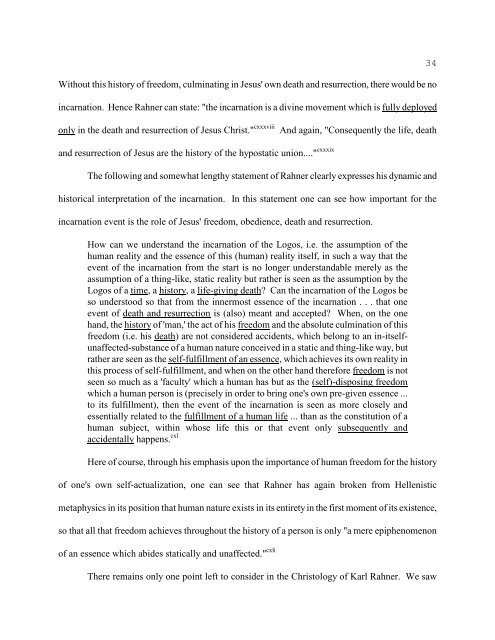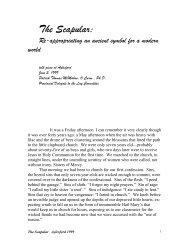Christocentrism of Charism – Buggert - CarmelStream
Christocentrism of Charism – Buggert - CarmelStream
Christocentrism of Charism – Buggert - CarmelStream
You also want an ePaper? Increase the reach of your titles
YUMPU automatically turns print PDFs into web optimized ePapers that Google loves.
Without this history <strong>of</strong> freedom, culminating in Jesus' own death and resurrection, there would be no<br />
incarnation. Hence Rahner can state: "the incarnation is a divine movement which is fully deployed<br />
only in the death and resurrection <strong>of</strong> Jesus Christ." cxxxviii And again, "Consequently the life, death<br />
and resurrection <strong>of</strong> Jesus are the history <strong>of</strong> the hypostatic union...." cxxxix<br />
The following and somewhat lengthy statement <strong>of</strong> Rahner clearly expresses his dynamic and<br />
historical interpretation <strong>of</strong> the incarnation. In this statement one can see how important for the<br />
incarnation event is the role <strong>of</strong> Jesus' freedom, obedience, death and resurrection.<br />
How can we understand the incarnation <strong>of</strong> the Logos, i.e. the assumption <strong>of</strong> the<br />
human reality and the essence <strong>of</strong> this (human) reality itself, in such a way that the<br />
event <strong>of</strong> the incarnation from the start is no longer understandable merely as the<br />
assumption <strong>of</strong> a thing-like, static reality but rather is seen as the assumption by the<br />
Logos <strong>of</strong> a time, a history, a life-giving death? Can the incarnation <strong>of</strong> the Logos be<br />
so understood so that from the innermost essence <strong>of</strong> the incarnation . . . that one<br />
event <strong>of</strong> death and resurrection is (also) meant and accepted? When, on the one<br />
hand, the history <strong>of</strong> 'man,' the act <strong>of</strong> his freedom and the absolute culmination <strong>of</strong> this<br />
freedom (i.e. his death) are not considered accidents, which belong to an in-itselfunaffected-substance<br />
<strong>of</strong> a human nature conceived in a static and thing-like way, but<br />
rather are seen as the self-fulfillment <strong>of</strong> an essence, which achieves its own reality in<br />
this process <strong>of</strong> self-fulfillment, and when on the other hand therefore freedom is not<br />
seen so much as a 'faculty' which a human has but as the (self)-disposing freedom<br />
which a human person is (precisely in order to bring one's own pre-given essence ...<br />
to its fulfillment), then the event <strong>of</strong> the incarnation is seen as more closely and<br />
essentially related to the fulfillment <strong>of</strong> a human life ... than as the constitution <strong>of</strong> a<br />
human subject, within whose life this or that event only subsequently and<br />
accidentally happens. cxl<br />
Here <strong>of</strong> course, through his emphasis upon the importance <strong>of</strong> human freedom for the history<br />
<strong>of</strong> one's own self-actualization, one can see that Rahner has again broken from Hellenistic<br />
metaphysics in its position that human nature exists in its entirety in the first moment <strong>of</strong> its existence,<br />
so that all that freedom achieves throughout the history <strong>of</strong> a person is only "a mere epiphenomenon<br />
<strong>of</strong> an essence which abides statically and unaffected." cxli<br />
There remains only one point left to consider in the Christology <strong>of</strong> Karl Rahner. We saw<br />
34



